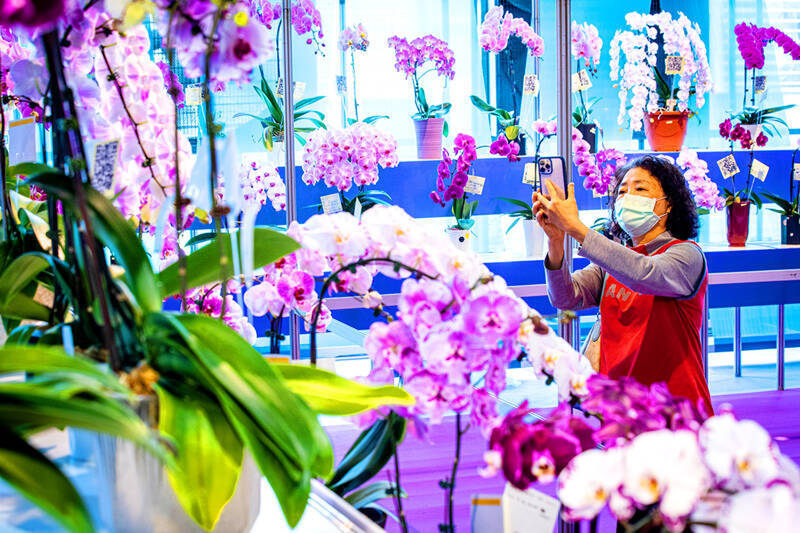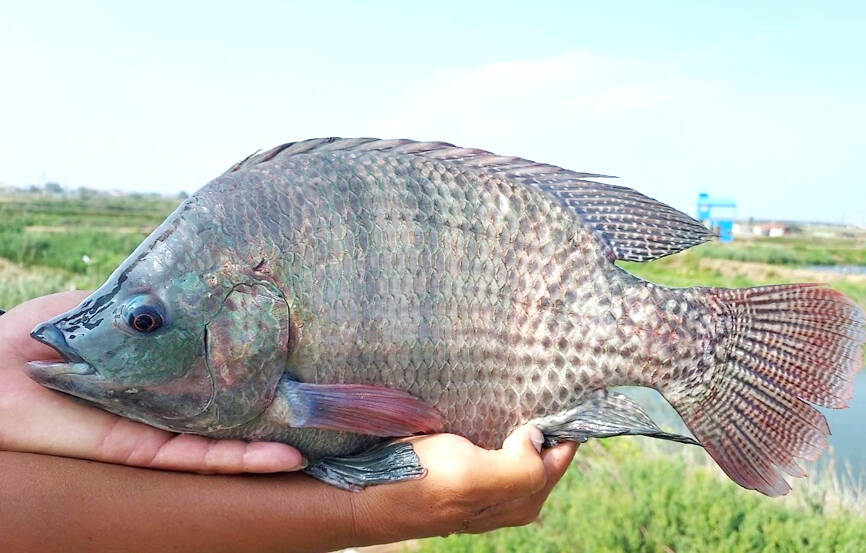The nation’s orchid and tilapia farmers urged the government to negotiate with Washington for a lower tariff rate to sustain exports to the US.
US President Donald Trump on Thursday announced a 20 percent tariff for Taiwan, lower than the 32 percent the US announced on April 2. Implementation had been delayed until Thursday to give Washington’s trading partners more time to negotiate lower tariffs.
President William Lai (賴清德) on Friday said that negotiations would continue, and that the 20 percent tariff was temporary.

Photo: Ritchie B. Tongo, EPA-EFE
Taiwan Orchid Growers Association secretary-general Tseng Chun-pi (曾俊弼) said that 40 percent of Taiwan-bred orchids used to be exported to the US without tariffs.
Although the implementation of the 32 percent “reciprocal” tariff rate was delayed, orchid exports to the US declined by 15 percent due to the 10 percent unilateral tariff rate the US applied, he said, calling on the government to negotiate for a lower rate.
Most orchid exports to the US were seedlings, and the production priority could be adjusted with the US market, Tseng said, adding that orchid pedicel exportation is feasible.

Photo: Taipei Times
Japanese and Vietnamese markets could also be developed and the industrial production structure could be reshaped accordingly, he said.
The government should allocate a special budget to fund small and medium-sized orchid-breeding companies to help them change production models, and offer them subsidies and loan extensions, Tseng said.
Increased tariffs would push up orchid production costs, which are now borne jointly by orchid farmers, and domestic and overseas suppliers, he said.
If the cost is transferred to consumers, the US market might shrink further, he added.
Yusa Farm director Chuang Cheng-hua (莊政樺) said that orchid farmers cannot deal with it, whether the US tariff rate is 32 percent or 20 percent, urging the government to continue negotiations to protect the industry.
While developing the Vietnamese market is feasible, action should be taken as soon as possible, given that Chinese orchid industry players are marching into the market, he said.
The US is also a major market for tilapia, with up to 70 percent of whole, frozen or sliced tilapia exported to the US.
Tainan Nanxun Aquaculture Production Association president Tsai A-yu (蔡阿玉) said the 10 percent tariff is acceptable, but 20 percent would have a much greater impact on the industry, particularly as tilapia processing factories would seek to drive down the prices of fish they buy from tilapia farmers.
The fish farming industry has been facing challenges posed by Typhoon Danas and heavy rainfall, she said, calling on the government to negotiate for a lower tariff to sustain the industry.
Meanwhile, Feng Chia University international business professor Yang Ming-hsien (楊明憲) on Friday said that although the US’ tariff for Taiwan is higher than those for Japan and South Korea, that does not mean that the Lai administration spared any effort.
“That means Taiwan did not compromise in terms of agricultural issues,” he said, adding that such negotiations would have also included relaxation of non-tariff trade barriers and increasing investments.
While the agricultural sector is concerned about the possibility of Taiwan letting in all US agricultural exports in exchange for lower tariffs, the government must adhere to the principle of food security and public health based on scientific evidence and international standards, Yang said.
The annual output value of Taiwan’s importation of bulk grain — soybeans, wheat and corn — amounted to nearly US$3 billion, of which US bulk grain imports made up about US$1.3 billion last year, he said.
Given that imports of US soybeans and corn were less than 50 percent, while imports of US wheat reached 70 percent, Taiwan could increase imports of soybeans and corn from the US as negotiation leverage, Yang said.
Most importers have been purchasing soybeans and corn from Brazil, as its prices are lower, he said, calling on the government to provide subsidies for the price gap to encourage US imports.
The bulk grain safety stock threshold of two months can also be extended to three months to boost US import amounts, with the increased cost burden partially borne by the government, Yang said.
Although bulk grain delegations usually visit the US for price negotiations and procurement in September, they should make a move as early as this month given the uncertainty of tariff negotiations, he said.
Additional reporting by CNA

The Coast Guard Administration (CGA) yesterday said it had deployed patrol vessels to expel a China Coast Guard ship and a Chinese fishing boat near Pratas Island (Dongsha Island, 東沙群島) in the South China Sea. The China Coast Guard vessel was 28 nautical miles (52km) northeast of Pratas at 6:15am on Thursday, approaching the island’s restricted waters, which extend 24 nautical miles from its shoreline, the CGA’s Dongsha-Nansha Branch said in a statement. The Tainan, a 2,000-tonne cutter, was deployed by the CGA to shadow the Chinese ship, which left the area at 2:39pm on Friday, the statement said. At 6:31pm on Friday,

The Chinese People’s Liberation Army Navy’s (PLAN) third aircraft carrier, the Fujian, would pose a steep challenge to Taiwan’s ability to defend itself against a full-scale invasion, a defense expert said yesterday. Institute of National Defense and Security Research analyst Chieh Chung (揭仲) made the comment hours after the PLAN confirmed the carrier recently passed through the Taiwan Strait to conduct “scientific research tests and training missions” in the South China Sea. China has two carriers in operation — the Liaoning and the Shandong — with the Fujian undergoing sea trials. Although the PLAN needs time to train the Fujian’s air wing and

The American Institute in Taiwan (AIT) put Taiwan in danger, Ma Ying-jeou Foundation director Hsiao Hsu-tsen (蕭旭岑) said yesterday, hours after the de facto US embassy said that Beijing had misinterpreted World War II-era documents to isolate Taiwan. The AIT’s comments harmed the Republic of China’s (ROC) national interests and contradicted a part of the “six assurances” stipulating that the US would not change its official position on Taiwan’s sovereignty, Hsiao said. The “six assurances,” which were given by then-US president Ronald Reagan to Taiwan in 1982, say that Washington would not set a date for ending arm sales to Taiwan, consult

A Taiwanese academic yesterday said that Chinese Ambassador to Denmark Wang Xuefeng (王雪峰) disrespected Denmark and Japan when he earlier this year allegedly asked Japan’s embassy to make Taiwan’s representatives leave an event in Copenhagen. The Danish-language Berlingske on Sunday reported the incident in an article with the headline “The emperor’s birthday ended in drama in Copenhagen: More conflict may be on the way between Denmark and China.” It said that on Feb. 26, the Japanese embassy in Denmark held an event for Japanese Emperor Naruhito’s birthday, with about 200 guests in attendance, including representatives from Taiwan. After addressing the Japanese hosts, Wang